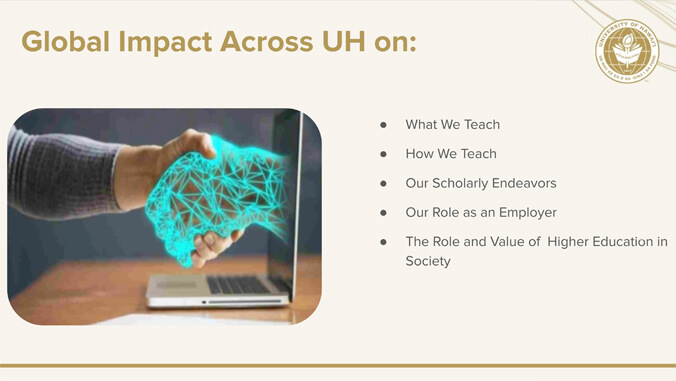The University of Hawaiʻi (UH) is taking significant steps toward a comprehensive, systemwide approach to artificial intelligence (AI), aiming to position itself as a leader in this transformative technology. President Wendy Hensel, during a presentation to the UH Board of Regents on August 21, emphasized the multifaceted impact of AI, likening its significance to that of electricity. She articulated a vision where AI is not only a technological shift but a redefinition of education, research, and workforce development within Hawaiʻi and globally.
The Transformative Power of AI
Hensel pointed out the critical role AI is expected to play across various sectors, asserting that it could reshape industries such as healthcare, agriculture, finance, and government. The urgency of the initiative is underscored by projections from leading financial and tech firms estimating that generative AI could affect up to 300 million jobs worldwide, with a significant portion of the U.S. workforce experiencing at least a 10% impact on their job tasks. Furthermore, AI’s potential to add $4.4 trillion in value to the global economy illustrates the vast opportunities lying ahead.
Comprehensive AI Integration
To harness the benefits of AI effectively, UH is adopting a multi-pronged strategy. This approach encompasses teaching, research, and operations, emphasizing the need for AI skills across all disciplines.
Curriculum Development: Hensel stressed the importance of equipping every student, regardless of their field of study, with AI skills that are increasingly demanded by employers. The university is committed to embedding AI content within existing courses and has introduced new academic offerings such as a Graduate Certificate in Applied Computing and a Professional Master’s in Computer Science with a focus on AI and Data Science.
Innovative Teaching Methods: The integration of AI tools like virtual teaching assistants and personalized learning content is being explored to enhance the educational experience. These tools aim to make learning more accessible and tailored to individual student needs.
Research Advancements: AI is being utilized to accelerate research initiatives at UH by improving the processing of vast datasets and enabling the construction of complex models. This research-centric approach is vital for keeping pace with rapid advancements in AI technologies.
- Operational Efficiency: AI is expected to streamline university operations, enhancing efficiency across various systems and services. This operationalization of AI not only supports academic goals but also contributes to smarter management of resources.
Collaborative Efforts and Community Engagement
To steer its AI initiatives, UH has formed an AI Planning Group and appointed its inaugural Chief Academic Technology Innovation Officer, informally referred to as the "AI czar." This role is pivotal for coordinating efforts across the ten campuses within the UH system.
In addition to internal initiatives, UH is actively seeking partnerships with major tech companies like Google, Microsoft, and IBM. These collaborations are aimed at providing professional development opportunities and fostering community engagement. By connecting students with industry leaders, UH is creating a pathway for emerging talent to thrive in an AI-rich environment.
Preparing for the Future
Hensel recognizes the dual nature of the AI transition—it is both daunting and exhilarating. However, she firmly believes that the University of Hawaiʻi is uniquely equipped to lead this transition. She reiterated that the role of higher education extends beyond imparting technical skills; it also involves grounding innovation in ethics and cultural values, ensuring that equity is a core principle as society navigates these changes.
Conclusion
The University of Hawaiʻi’s systemwide approach to artificial intelligence marks a significant step forward in harnessing the power of this technology to transform education, research, and workforce development. By integrating AI across multiple facets of its operation, UH is not only preparing its students for an AI-driven future but also positioning itself as a leader in the broader conversation about the implications of AI in society.
As AI continues to evolve, the proactive strategies being developed by UH can serve as a model for other educational institutions grappling with similar challenges. With a focus on comprehensive skills development, ethical considerations, and collaborative efforts, UH is poised to navigate the complexities of an AI-enhanced world, striving to ensure that the potential of this transformative technology is realized for the benefit of all. By leading Hawaiʻi through this transition, UH aims to not only adapt but also thrive in the multifaceted landscape created by artificial intelligence.









